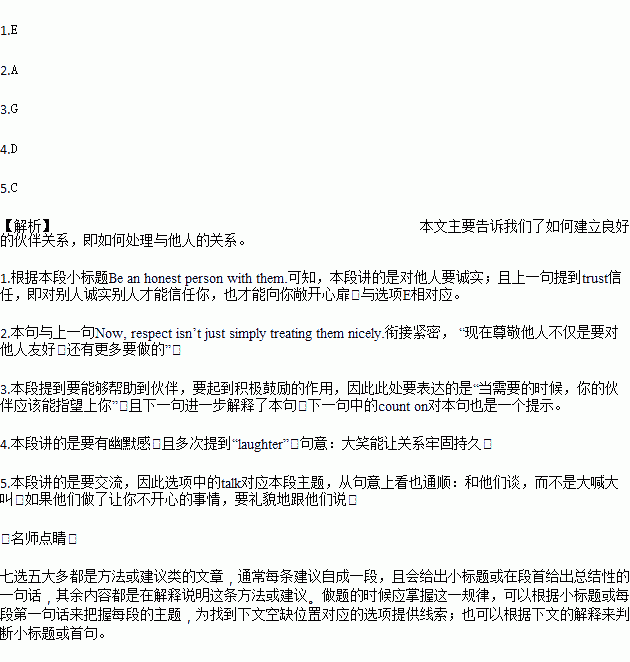题目内容
Are you new to experiencing relationships ? Well, let me give you some advice on how to have a healthy relationship with your partners.
1. Be an honest person with them. Don’t hide things from them, and don’t lie. Don’t be afraid to say things that aren’t flattering about yourself. Getting them to trust you is the most important thing in any relationship. If there is no trust, there’s nothing there. 1.
2. Make sure you give them respect. Now, respect isn’t just simply treating them nicely. 2. You have to learn to adjust to their liking. Basically, learn to study your partner’s moods, wants and needs. Don’t just think about yourself, but think about what your partners need as well.
3. Make sure you are encouraging to your partners. Always be willing to help them and give them honesty and positive things at the time3.. Make them feel you are someone they can count on and build a future with.
4. Make sure you have a good sense of humor with them. Laughter is the key to happiness. Laugh a lot with them, and joke with them4., Laughter may seem silly, but it’s the secret to a lot in life. It will keep the sparks alive.
5. Make sure the communication is good. This usually goes along with trust, so always communicate how you feel even if it’s something that upsets you. 5. If they did something that made you unhappy, tell them about it in a respectful manner. It’s important to communicate this to them, not to keep it bottled up.
A.There is a lot more to it.
B.Show them your personality.
C.Instead of screaming, talk to them.
D.Laughter keeps the relationship strong and lasting.
E.So please be honest and they’ll learn to open up to you.
F.Don’t expect too much in a relationship.
G.Your partners should be able to count on you when necessary.
随着网络的日益发展,网店成为一种新时尚,并且越来越多的学生开始创办网店。假定你是李华,是校报记者,请以“学生是否可以开办网店”为主题给校报撰稿。
支持 | 反对 | 你的观点 |
早一步接触社会 得到实践的机会 | 分心,影响学业; 社会经验少,容易被骗 | ... |
注意:
1.词数100左右;
2.可以适当增加细节,以使行文连贯;
3.标题和开头已经写好,不计入总词数。
Should Students Open Online Stores?
With the Internet developing rapidly, creating an online store becomes trendy. ___________________________________
_________________________________________________________________________________________________________________________________________________________________________________________________________________________________________________________________________________________________________________________________

